
5th IIPT African Conference Delegates Unanimously
Adopt Lusaka Declaration on Sustainable Tourism Development, Climate Change and Peace
The 5th IIPT African Conference on Peace through Tourism, held at the Hotel InterContinental Lusaka, Zambia, from 15–20 May, 2011, was the best IIPT African Conference to date. More than 440 delegates from 36 countries participated in the Conference, sharing their experiences, ideas, wisdom and commitments toward the Conference theme:
“Meeting the Challenges of Climate Change to Tourism
in Africa and the Developing World”
The Conference was organized under the patronage of His Excellency President Rupiah B. Banda and hosted by the Zambia Ministry of Tourism, Environment, and Natural Resources, Hon. Catherine Namugala, Minister.
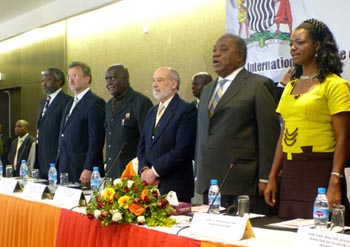
From left to right as Zambia National Anthem opens 5th IIPT African Conference: Dr. Patrick Kalifungwa, Vice Chancellor, Livingstone International University of Tourism Excellence and Business Management (LIUTEBM); Zoltan Somogyi, Executive Director, World Tourism Organization; Dr. Kenneth Kaunda, First President of Republic of Zambia; Louis D’Amore, IIPT Founder and President; Republic of Zambia President, Rupiah B. Banda; and Hon. Catherine Namugala, Minister of Tourism, Environment and Natural Resource
Aim of Conference
The aim of the 5th IIPT African Conference was to showcase models of “best practice” in mitigating and addressing the anticipated impacts of climate change to tourism in Africa and the developing world.
Conference Goals
1. Demonstrate the critical linkages of climate change to tourism and poverty reduction.
2. Identify factors and practices that contribute to “Meeting the Challenges of Climate Change to Tourism,” while continuing to grow and nurture sustainable tourism development that lifts people out of poverty.
3. Promote public-private sector – NGO – civil society partnerships and collaboration toward socially and environmentally responsible sustainable tourism development.
4. Continue “Building Bridges of Tourism, Friendship and Collaboration” among nations in Africa and other regions of the world in support of the U.N. Millennium Development Goals, recognizing that we are all custodians of our planet’s bountiful resources and majestic beauty.
Conference Opened by President Rupiah B. Banda
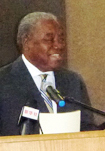 In his keynote address, Zambia President Rupiah B. Banda stated that the tourism sector plays a very important role in the social and economic development of Africa and the developing world, and that tourism can only flourish when there is peace. He emphasized that tourism to Zambia, like many African and other developing countries, is nature-based, and therefore highly sensitive to climate change. He noted that Zambia is activating a national climate change response strategy with a number of projects and campaigns that are designed to control emissions; address the issues of desertification and deforestation; and provide climate resilience for agriculture. Official government programs are being supplemented by those sponsored by civil society organizations, he said, but more needs to be done. In his keynote address, Zambia President Rupiah B. Banda stated that the tourism sector plays a very important role in the social and economic development of Africa and the developing world, and that tourism can only flourish when there is peace. He emphasized that tourism to Zambia, like many African and other developing countries, is nature-based, and therefore highly sensitive to climate change. He noted that Zambia is activating a national climate change response strategy with a number of projects and campaigns that are designed to control emissions; address the issues of desertification and deforestation; and provide climate resilience for agriculture. Official government programs are being supplemented by those sponsored by civil society organizations, he said, but more needs to be done.
 Zambia Minister of Tourism, Environment and Natural Resources Hon. Catherine Namugala emphasized the need to mobilize a global agenda in meeting the challenges of climate change, noting that Africa, with approximately 14 percent of the world’s population, contributes only 2.3 percent of Global Green House (GHG) Gases, yet is particularly vulnerable to its effects. She said that tourism has the potential to reduce poverty in developing countries but is already being adversely affected by climate change. Minister Namugala highlighted the importance of research, public awareness and sustained advocacy. Zambia Minister of Tourism, Environment and Natural Resources Hon. Catherine Namugala emphasized the need to mobilize a global agenda in meeting the challenges of climate change, noting that Africa, with approximately 14 percent of the world’s population, contributes only 2.3 percent of Global Green House (GHG) Gases, yet is particularly vulnerable to its effects. She said that tourism has the potential to reduce poverty in developing countries but is already being adversely affected by climate change. Minister Namugala highlighted the importance of research, public awareness and sustained advocacy.
 Zoltan Somogyi, Executive Director, World Tourism Organization (UNWTO), noted the importance of tourism to the socio-economic growth of African and other developing countries and urged that the continued and rapid advancement of tourism be green and sustainable. He called on the travel and tourism industry to address climate change by both reducing GHG emissions and taking measures for adaptation. Zoltan Somogyi, Executive Director, World Tourism Organization (UNWTO), noted the importance of tourism to the socio-economic growth of African and other developing countries and urged that the continued and rapid advancement of tourism be green and sustainable. He called on the travel and tourism industry to address climate change by both reducing GHG emissions and taking measures for adaptation.

Geoffrey Lipman, Director, GreenEarth Travel, said it was time to unleash the potential of tourism with a paradigm shift that envisions tourism as a mainstream change agent embracing quadruple bottom-line reporting and “smart travel” that is carbon neutral, environmentally green, ethical and of high quality, regardless of low economy or luxurious travel.
Other featured speakers included ministers of tourism, senior representatives of U.N. agencies, regional organizations, tourism boards, non-governmental organizations, the media and leading academics.
Lusaka Declaration on Sustainable Tourism Development,
Climate Change and Peace
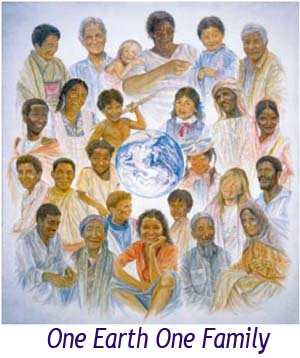 The Lusaka Declaration draws together the linkages of tourism, environment, climate change and peace, noting the exponential growth in population from 1.6 billion in 1900 to 7 billion in 2011, and that it now takes the Earth one year and six months to regenerate the renewable resources that are consumed in one year. The Lusaka Declaration draws together the linkages of tourism, environment, climate change and peace, noting the exponential growth in population from 1.6 billion in 1900 to 7 billion in 2011, and that it now takes the Earth one year and six months to regenerate the renewable resources that are consumed in one year.
The Declaration goes on to state that the warmest 10 years on record have all occurred since 1998, and that there have been a growing number of extreme weather events in regions throughout the world within the past two years. While Africa and other developing countries are least responsible for the causes of climate change, they are particularly vulnerable to the effects that threaten to hinder progress with reducing poverty and the U.N. Millennium Development Goals.
Within this context, research indicates that a world at peace within a four-year period, from 2006 through 2009, would have added U.S. $28.3 trillion to the global economy – enough to cut the debt of ALL nations by 50 percent; enough to end poverty and to meet the challenges of climate change.
The Declaration states that the global challenges facing humanity call for global solutions and cooperation at all levels – and by all sectors, public and private, and civil society as a whole – on an unprecedented scale. Peace will be an essential prerequisite to achieve this level of cooperation and will also generate the additional economic wealth to fund these solutions.
Travel and tourism, the world’s largest industry, affecting every sector of society, in virtually every nation, an industry that is founded on peace and that contributes to peace and understanding, has a key leadership role to play in achieving these solutions.
The Declaration calls on all sectors of the travel and tourism industry to support the leadership role of UNWTO, UNEP and WMO in the specific actions called for in the Davos Declaration: Climate Change and Tourism – Responding to Global Challenges and sets out a series of actions to be taken by the travel and tourism industry, governments and international development agencies and travelers.
The Declaration was unanimously adopted by the more than 440 delegates from 36 nations of Africa, Asia, Europe, North America and the Caribbean.
To view the full four-page document, please click here for the Lusaka Declaration.
Traditional Leaders Forum on Tourism Results in
Bridge to North American Indigenous Leaders
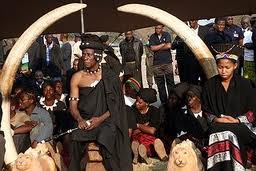 The first-ever Traditional Leaders Forum in Africa, organized in collaboration with the Zambia Ethno Tourism and Cultural Tourism Alliance (ZECUTA), was one of the main features of the 5th IIPT African Conference. The Forum was moderated by Joseph Zulu, President, ZECUTA. His Royal Highness Senior Chief Mukuni of the Toka Leya people (tribe) was the Forum’s keynote speaker. The Forum was of particular importance for many African countries as traditional/tribal structures are key stakeholders and stewards of development and tourism in tribal areas. The first-ever Traditional Leaders Forum in Africa, organized in collaboration with the Zambia Ethno Tourism and Cultural Tourism Alliance (ZECUTA), was one of the main features of the 5th IIPT African Conference. The Forum was moderated by Joseph Zulu, President, ZECUTA. His Royal Highness Senior Chief Mukuni of the Toka Leya people (tribe) was the Forum’s keynote speaker. The Forum was of particular importance for many African countries as traditional/tribal structures are key stakeholders and stewards of development and tourism in tribal areas.
The Forum focused on three intertwined imperatives: 1) how best to increase indigenous tourism in Zambia and throughout Africa; 2) relationships with government departments and international organizations; and 3) how to build bridges of indigenous tourism, friendship and collaboration within Africa and other regions of the world.
The main recommendations from the Forum are:
1. Create a unified symbol and message (a brand) to represent the chiefdoms and cultures of Zambia to the global tourism markets. Install and support His Royal Highness Senior Chief Mukuni as the coordinating point for this unified symbol.
2. With the full participation of chiefdoms, create permanent policies and programs to seek, define and retain  indigenous knowledge and wisdom for incorporation into tourism development standards to move Zambia toward ecological balance. indigenous knowledge and wisdom for incorporation into tourism development standards to move Zambia toward ecological balance.
3. Empower the people of Zambia's chiefdoms with the right to participate in all decisions affecting their traditional lands, territories and resources.
Participating in the Forum, as a special guest, was Ben Sherman, President, Native Tourism Alliance, North America, who has agreed to work with IIPT in developing an international network of traditional tourism leaders.
Youth Forum Results in Formation of IIPT Youth Chapter
A Student/Youth Leadership Forum brought together more than 50 bright, energetic and committed students and youth leaders from Zambia and other African countries committed to playing an important role in the future development of sustainable tourism in Africa. The Children and Youth Welfare Foundation, and its affiliated tourism clubs in the Zambia schools, partnered with IIPT in the organization of the Forum.

Since its First Global Conference in Vancouver, 1988: “Tourism – A Vital Force for Peace,” IIPT has featured a Student/Youth Leadership Forum in each of its major conferences and summits with the belief in sharing the values and philosophy of “peace through tourism” with future leaders of the industry and the belief that the creative and motivated voice of youth deserves a platform at such conferences.
The Forum resulted in the formation of an IIPT Youth Chapter with the aim of coming together for media programs, newspaper articles, social networks, such as Facebook, and music. Forum participants also aim to become involved in nature conservation, the planting of trees and interaction with U.N. organizations to fund youth initiatives to combat climate change.
A key recommendation of the Forum is for the integration of climate change issues into the curricula at all levels of education.

Educators Forum Brings Together Leading Educators
from Africa and Other Regions of the World
The Educators Forum, organized in partnership with Livingstone International University of Tourism Excellence and Business Management (LIUTEBM), and moderated by Dr. Patrick Kalifungwa, Vice-Chancellor, LIUTEBM, continued the tradition begun at IIPT’s First Global Conference, Vancouver, 1988, of bringing together leading educators to share their ideas, research and curricula relevant to the Conference theme.
Key outcomes from the Forum include the need for:
1. More and broader education and awareness campaigns that focus on linkages and interactions between climate change, tourism and society.
2. Increased research on drivers of climate change and their impact on tourism and sustainable development.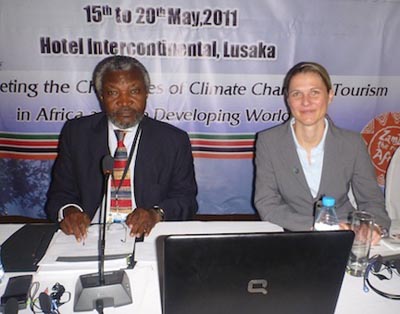
3. Well-designed public awareness programs.
4. Natural disaster planning, incorporating the “4 R’s” – riskreduction, readiness, response and recovery. The importance of comprehensive planning across the public and private sectors can only increase over time as the number and intensity of natural disasters increase.
5. Monitor emerging trends and facilitate access to state-of-the art research and communication, utilizing a net-based content management system that includes a research archive, relevant links and communication tools to integrate and share research about climate change and tourism in Africa.
Dr. Patrick Kalifungwa, Moderator of Forum, Vice Chancellor, LIUTEBM and
Susanne Becken, Lincoln University , New Zealand
IIPT Scholarship Award
IIPT was proud to present a U.S. $1500 scholarship award to the inter-disciplinary team of college students who wrote the best paper on the theme of the Conference. Students were required to be enrolled in an African university or university in a developing country from another region of the world.
Winners of the award were Shingisanai Bvunzawabaya, University of Zimbabwe; Tafadswa Razemba, University of South Africa; and Abgial Chibweza, University of Zimbabwe. The scholarship winners are students of Professor Rose Mukogo who also took part in the Conference as a speaker.
IIPT began its tradition of awarding a scholarship with its First Global Conference, Vancouver, 1988: “Tourism – A Vital Force for Peace.” Scholarships were first awarded to the individual student writing the best paper on the theme of the Conference. Beginning with IIPT’s 3rd African Conference, Lusaka, 2005, it was recognized that today’s global issues, such as climate change, are so complex and multi-layered that they require inter-disciplinary approaches and that the education and training required for inter-disciplinary approaches should begin in universities – if not sooner. Accordingly, IIPT scholarships are now awarded to inter-disciplinary teams with a view toward encouraging inter-disciplinary approaches in academic settings.
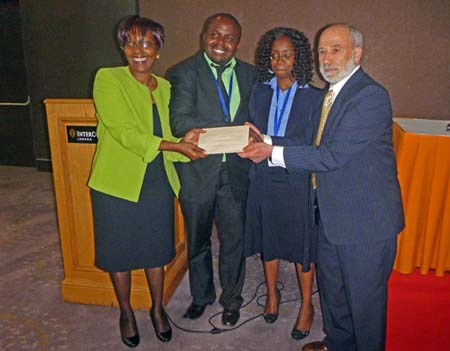
Receiving the coveted IIPT Scholarship award with their professor Rose Mukogo (on left) are Shingisanai Bvunzawabaya, University of Zimbabwe , and Tafadswa Razemba, University of South Africa . Missing from the photo is Abgial Chibweza, University of Zimbabwe .
Selected Conference Presentations to be Published
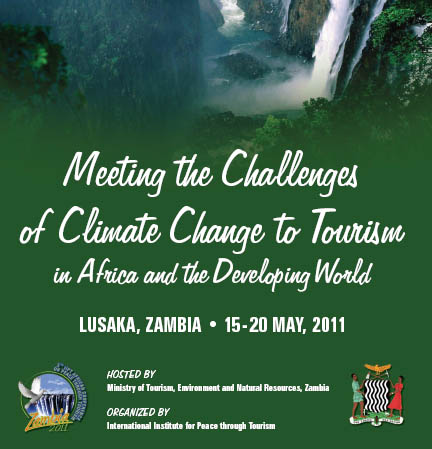 Participants in the 5th IIPT African Conference believed that speaker presentations should be made available to government officials, industry executives, developers, policy makers, practitioners and academics. Accordingly, a book of selected papers/presentations will be published in collaboration with IIPT’s academic partner in the Conference, Livingstone International University of Tourism Excellence and Business Management (LIUTEBM). The book will be distributed in digital form in collaboration with the World Tourism Organization (UNWTO). Participants in the 5th IIPT African Conference believed that speaker presentations should be made available to government officials, industry executives, developers, policy makers, practitioners and academics. Accordingly, a book of selected papers/presentations will be published in collaboration with IIPT’s academic partner in the Conference, Livingstone International University of Tourism Excellence and Business Management (LIUTEBM). The book will be distributed in digital form in collaboration with the World Tourism Organization (UNWTO).
Articles are welcome from other experts who were not able to attend the Conference, but who feel they have an important contribution to make to the body of knowledge in “Meeting the Challenges of Climate Change to Tourism.”
Please send your proposed article to Louis D’Amore, ljd@iipt.org, with a copy to louis.damore@gmail.com.
National Peace through Tourism Week
Declared by President Banda
The important role of travel and tourism in contributing to peace and sustainable development was highlighted throughout Zambia and Africa, by His Excellency Rupiah B. Banda declaring the week of the Conference “National Peace through Tourism Week” and the resulting media coverage of the conference and week’s activities.
National television, radio and press coverage began the week before the Conference, with interviews and news of the upcoming Conference, continued throughout the week, with coverage of the Opening Ceremony and proceedings of the Conference, and extended into the following week, with further interviews and press coverage of the outcomes, particularly the Lusaka Declaration.
Thanks to our media partners, and particularly eTurbo news and TravelVideo.TV, the 5th IIPT African Conference received broad international coverage as well.
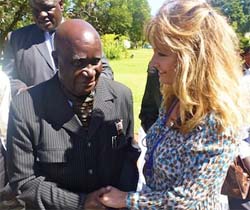 Bea Broda, Producer, TravelVideo TV with
Bea Broda, Producer, TravelVideo TV with
Zambia’s first President , Dr. Kenneth Kaunda
|
 Thomas Steinmetz,
Thomas Steinmetz,
Producer,
eTurboNews |
A highlight of the week was the re-dedication of the IIPT International Peace Park at Victoria Falls with Conference delegates and dignitaries from Livingstone and the Toka Leya indigenous people of the area. The IIPT International Peace Park serves as a living and lasting legacy of the Conference at one of the seven natural wonders of the world.

IIPT Board Chairman Timothy Marshall offering a prayer to begin Peace Park Re-dedication Ceremony; Hon. Catherine Namugala plants the first tree;Chieftess of the Toka Leya tribe waters peace tree; and Ben Sherman takes part in traditional dance of the Toka Leya tribe.
A Note of Thanks and Appreciation to
Our Hosts, Partners, Sponsors and Supporters
IIPT would like to express its sincere thanks and appreciation to all who contributed to the success of the 5th IIPT African Conference, and particularly to our:
Conference Patron: His Excellency President Rupiah B. Banda;
Host: Zambia Ministry of Tourism, Environment and Natural Resources, and particularly Hon. Catherine Namugala, members of the National Organizing Committee, and the welcoming, friendly people of Zambia;
Speakers: who contributed their time, wisdom, ideas and experiences
Partners: World Tourism Organization (UNWTO), Pacific Asia Travel Association (PATA),
Regional Tourism Organization of Southern Africa (RETOSA), World Travel Market, Jamaica Business Resource Center, Sustainable Travel International, The Blue Yonder and Center for Responsible Travel (CREST);
Sponsors: U.N. Development Program (UNDP), Zambia Tourism Board, EcoBank, Blue Nile Inn, Church Road Lodge, Garden Group of Hotels and Golden Bridge Hotel;
Media Partners: eTurboNews, TravelVideo.TV, BC Pictures, TravelMole, Lights of Africa, India Tourism eCatalog, Tourism and Wildlife, WorldTourism Directory, Society of American Travel Writers (SATW), and Africa Diaspora Tourism;
Educational Partner: Livingstone International University of Tourism Excellence and Business Management (LIUTEBM);
Traditional Leaders Partner: Zambia Ethno Cultural and Tourism Alliance (ZECUTA); and
Student/Youth Leaders Partner: Children and Youth Welfare Foundation;
Official Airline: South African Airways for their support and collaboration;
Venue: Hotel InterContinental Lusaka, for their excellent service and hospitality;
Supporting Organizations: who assisted in promoting the conference; and
The more than 440 delegates from 36 countries for their enthusiastic and energetic participation, commitment, and valuable contribution of their insights, ideas, experience and wisdom throughout the conference.
Sponsors, Partners and Supporters
Sponsors
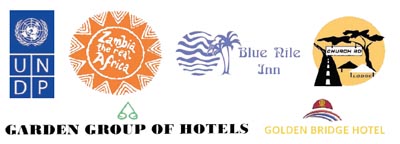
Partners

Media Partners

Supporters

Traditional Leader, Educational and
Student/Youth Leader Partners

Official Hotel & Airline
|













 In his keynote address, Zambia President Rupiah B. Banda stated that the tourism sector plays a very important role in the social and economic development of Africa and the developing world, and that tourism can only flourish when there is peace. He emphasized that tourism to Zambia, like many African and other developing countries, is nature-based, and therefore highly sensitive to climate change. He noted that Zambia is activating a national climate change response strategy with a number of projects and campaigns that are designed to control emissions; address the issues of desertification and deforestation; and provide climate resilience for agriculture. Official government programs are being supplemented by those sponsored by civil society organizations, he said, but more needs to be done.
In his keynote address, Zambia President Rupiah B. Banda stated that the tourism sector plays a very important role in the social and economic development of Africa and the developing world, and that tourism can only flourish when there is peace. He emphasized that tourism to Zambia, like many African and other developing countries, is nature-based, and therefore highly sensitive to climate change. He noted that Zambia is activating a national climate change response strategy with a number of projects and campaigns that are designed to control emissions; address the issues of desertification and deforestation; and provide climate resilience for agriculture. Official government programs are being supplemented by those sponsored by civil society organizations, he said, but more needs to be done. Zambia
Zambia Zoltan Somogyi,
Zoltan Somogyi, 

 The first-ever Traditional Leaders Forum in Africa, organized in collaboration with the
The first-ever Traditional Leaders Forum in Africa, organized in collaboration with the 




 Participants in the 5th IIPT African Conference believed that speaker presentations should be made available to government officials, industry executives, developers, policy makers, practitioners and academics. Accordingly, a book of selected papers/presentations will be published in collaboration with IIPT’s academic partner in the Conference, Livingstone International University of Tourism Excellence and Business Management (LIUTEBM). The book will be distributed in digital form in collaboration with the World Tourism Organization (UNWTO).
Participants in the 5th IIPT African Conference believed that speaker presentations should be made available to government officials, industry executives, developers, policy makers, practitioners and academics. Accordingly, a book of selected papers/presentations will be published in collaboration with IIPT’s academic partner in the Conference, Livingstone International University of Tourism Excellence and Business Management (LIUTEBM). The book will be distributed in digital form in collaboration with the World Tourism Organization (UNWTO).